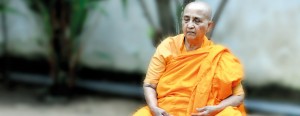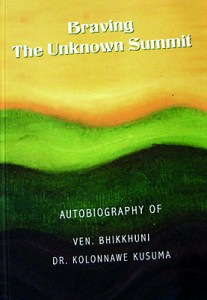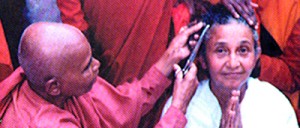Wed, 2012-11-07 03:28 — editor
By A
Correspondent
The new face of the
Tamil Tigers appear as human rights activists. Having committed the worst
atrocities for three decades, they are now marching in the corridors of power
in Geneva. The Tigers and their cubs are harnessing the vast network in the
West and in Tamil Nadu to regroup and human rights lobby has fallen prey to
them.
The
Tamil tigers offered votes to Western politicians dependent on minority votes
and money to corrupt Tamil Nadu politicians. Both M. Karunanidhi and MGR
Ramachandran supported the LTTE and it was no suprise that M.K. Stalin was
received by the controversial Navanethem "Navi" Pillai, the UN High
Commissioner for Human Rights in Geneva.
The
Tamil tigers demonize anything and everything in Sri Lanka, enlist the support
of vociferous groups to campaign on their behalf on rights and for funds;
resort to emotive techniques to sustain the diaspora sympathy but struggle to engage
the community in Sri Lanka that has seen through their deception. The Tamil
tigers continue to manipulate politicians, in their host country
constituencies, who are keen to promote topical burning issues; they manipulate
rights groups, aid agencies and feed the hungry press. No story is worth
telling unless you can make it emotive. It is only a few courageous western
journalists and writers concerned about global security go the extra mile to
scratch beneath the surface of the propaganda to expose terrorist front cover
and sympathetic agencies and their tactics.
The
masses respond to stories of death, destruction, abuse, torture, corruption,
women, children and tears. The Tamil tiger terrorists gripped their own
community for 30 years in a blanket of deprivation and horror by cutting out
media and contact with other communities, they gripped the Tamil diaspora
through their agents that feed the diaspora with stories, video clips, drama,
film, songs of fear and horror and in turn got their communities to campaign in
the host countries. The Tamil tigers are notorious for showing images of the
Hindu festival where men hang on hooks and go in procession – shown as torture,
men rolling on the soil around the Hindu temple in prayer as being tortured,
and images of terror gripped under developed areas as not being developed due
to discrimination.
The
height of deception comes when the Tamil tiger atrocities of massacres and
impact of suicide bombings and assassinations conducted for 30 years targeting
Buddhists, Muslims and Christians in cities and border villages - -- projected
as Tamils being victimized. Members of the Tamil community often say “we have
lost so much credibility with lies, lies and so much lies, that we feel ashamed
to say we are Tamil”.
A
community put to shame by the violence justifying Tamil tiger supporters
overseas. The credit-card fraud, insurance-fraud, human smuggling, drug
trafficking ---, the legacy of the infamous Liberation Tigers of Tamil Eelam
(LTTE).
Members
of the Tamil community often say in hushed tones that the LTTE destroyed their
credibility and dignity as a community that lived and worked honestly. Why the
hushed tones?
Due
to the lingering fear that they will be contacted, a Tamil tigers overseas will
get to know, though those receiving money from Canada, Germany or France and
their support enlisted. While those who receive the calls and receive the money
say that they wont be fooled anymore. But we need the money. We take the calls.
We agree with them. But we know that they fund violence and we are their
servants! They think we will continue to be their servants in violence. No
more. We will not be duped. The diaspora and international community might be –
but not us.
Some
say that because they send the money people don’t want to work “what is the
point in working everyday when we can get lumpsums from abroad?” – thereby
preventing the ordinary man from returning to what was once known as a “honest
day’s work” where one would work earn and spend one’s earnings to uplift one’s
family. The Tamil tigers and the culture they spread was based on handouts from
the Western diaspora and donor organizations.
It
came in millions and billions of dollars as revealed in the investigation into
the Tiger front Tamil Rehabilitation Organization and its supporter Raj
Rajaratnam in the United States of America. The money flowed with every attack,
with every assassination, the bounty! The diaspora Tamil tigers paid dollars
for the blood spill. The price was greater the bigger the target. They sent
pennies and the cents collected on the streets as well as the thousands from
the wealthy to sponsor murder in another country.
The
Tamil tiger agenda is exercised through NGOs and INGOs, Human rights groups,
Peace groups and movements. Everyone wants to be somebody – therefore we will
always find the odd Sinhalese that wants to be famous campaigning on behalf of
the Tamil tigers, feeling good about themselves, helping to ease the guilt or
justify an inadequacy.
Looking
at images of those that died when held hostage by the Tamil tigers and
attempting to interpret that the body count was a result of the government
troops. Did anyone do a body count of those the Tigers assassinated for trying
to escape? Those that died when the Tamil tiger artillery was aimed parallel to
the ground to attack Sri Lankan troops? Or when Tamil tiger artillery
coordinates were specifically given to hit their civilian hostages in an
attempt to “sacrifice them” for the media. When these bodies were collected and
laid out or discovered in piles by the Sri Lankan Forces the easy
interpretation was – they are standing there – they must have done it. The
question is would the troops have risked their lives to rescue the civilians
amisdst Tamil tiger artillery and weapons fire? Does anyone question as to why
there is “no war” from the day the terrorist leader was pronounced dead? Then
one would conclude that no terrorism=no war.
Agencies
and individuals breathing life into the world’s most ruthless terrorist
organisation should be held accountable. Not a single apology to any of the
massacred villagers, destroyed religious sites, bombings of civilians, maiming
and disabling of civilians, from the terrorist support groups, funders, and
rights groups that breathed life into terrorist group.
The
Tamil tigers, chameleon like adjust quickly to new and different ways of
achieving their agenda. The Tamil tigers to keep their funds coming in, must
enlist Western support to campaign on their behalf, must keep the diaspora
engaged for funds, must try to keep the local community on side to ensure their
side jobs and that little extra income. How do they do this?
They
market images of wailing women, crying children, terrorist held territory
images, to project an image of injustice. Little does the unsuspecting viewer
know that they were created by the terrorists. An attempt made to dupe an
Australian magistrate into thinking a Tamil asylum seeker was tortured when he
displayed images of a Hindu festival of himself hanging on hooks, and another man
rolling in the sand. British Immigration officers duped into believing the
cigarette burns are torture marks. These are well established preplanned
methods that can be selected from a “menu” for those that wish to seek asylum.
When a Tamil tiger supporter that facilitated human trafficking was asked why
so many try to leave? Do they not like living here that much? He looked baffled
and responded “Oh no, it is because those countries take them, so they go
there. If they take them, then why not go?”
Deception
was their forte and still is. Those that were entrapped into supporting
terrorists, respond differently. Some speak out while others simply move away
from providing the support. Still others continue to support as they just
cannot bear to think they were sucked in, were naïve, got caught, cant bear to
feel hood winked or got cheated and wants to justify and rationalize their
stand trying not to see the horrors of terrorism.
Well
why do the media overseas say that women are abused and harassed?
A
senior member of the Tamil community says “the drama continues for a few rupees
or promise of a boat ride to a western country with free accommodation, meals
and allowance”. The Tamil tigers who were not rehabilitated and hid among the
civilians or those that did not disclose their true identity and blended with
the community are keen to work for Tamil tiger diaspora money. “They will talk
the talk and walk the walk”.
The
Tamil tigers used street theater and drama to recruit the young to their cadre.
The Tamil tigers continue to use drama and theatre for their work even to date,
says Jesudasan. They pay the families and money produces the actors and
actresses. You can earn much from giving a clip or an interview. Besides they
say it is what we must do to help our people. The Tamil tigers will use and
abuse the system, the living and the dead to achieve their aims.
Sivaseelan
is annoyed when he says “What you people don’t understand is every time there
is some talks in Geneva the tigers people will get ready. They are milking the
West well and all those reporters hungry for stories. They are not fools they
make it like it is very secretive, very dangerous, and very secretive and
exciting and give the story or interview. Lot of money in it.They thank the new
tigers that they can still make money like this.
When
I see what they say on these interviews, I think they are still making a bad
name for us (Tamils). Also not their fault no? When there are so many in the
West that like stories like these and they become famous when they put the
story. So they think why not use them. They look-after with gifts those that
put the stories also. Tigers people will always use other people’s foolishness.
Everyone is happy the acting family is paid, the tigers people are happy, the person
listening to the story is happy for a good story. So it is a business also.
Amudha
who lived for one year in a rehabilitation center and subsequently in the
community amongst civilians and other reintegrated former Tamil tiger families
had this to say: last time also when there was something in Geneva they told
stories about rapes and abuse on those in custody. I have lived in
rehabilitation and I used to look after women in the female regiment. No one
has been raped or I will hear of it. I keep in touch with these women who have
been in centers and now in the community. If there was we will say.
But
when they treated us with respect then we must not lie. Where I live now is
outside the village on the edge of the forest area. I live with 6 families that
were with the Tamil tigers. All the women live on their own with the children
while the men go to work in other areas or some have died during terrorism. We
are living safely and without problems. If there was so much problems how come
we do not experience. Even if we don’t experience we hear from all areas
everything that happens and no one has said about abuse or rape. We are not
afraid to speak out. These stories are nice stories for the newspapers and
overseas I think that is what they like to hear is happening. It is the police
that come to make sure that we don’t have any problems and we are happy for
that. We have had to ask for our police post not to be removed from our area.
So if abroad there are stories that the police and army are doing abuses I
think they make money from the stories.
Vijidaran
said if there are so many abuses why are so many rehabilitees joining the Civil
defense force? I see more women joining. If they were badly treated they won’t
joint and be trained by the Sri Lanka Army? If someone says there were rapes
how is it that most joining to the CDF is women? I think there is no anger or
bitterness either because if that is the case they will not want to be trained
by the Sri Lanka Army.
Jeyani
smiles when she says if we were abused in rehabilitation we will be angry. If
we heard others were abused we will be even more angry. You must ask people who
speak of abuse whether they know that 30 of my friends went back to live inside
the rehabilitation center after they were reintegrated into the community.
Would they go back to follow the pre-school training course? Some of the
rehabilitees were sent home before they finished rehabilitation period to see
what life is like after we are reintegrated. Everyone came back.
All
the men and the women. I think they should not try to tell more lies now - but
be truthful.
They
can never say lies about a program that we were all part of and we progressed
through the rehabilitation. I was able to get a job after my rehabilitation
period in a good company. I learnt all the skills when in the center – I learnt
the value of being a woman, not have to be like a man to be respected in the
LTTE. I learnt how to present myself as I want to be, to dress and even to smile.
Those who know will know. Those who don’t want to know will try to destroy an
experience we thought helped us to come back to society. We suffer the
consequences of bad things we do and the lies we tell.
Bad
things can’t continue forever, the Gods won’t allow it. See what happened? If
the government did not stop this we will still be in the jungle hating people
that we never knew.
Thinking
that what we do is right. We have now moved on and left the bad past. We have
moved into light. We have another chance in life to correct anything wrong we
have done. We can all decide when we will make a change for good. Anyone can
start today if they want.
The
responsibility for promoting and facilitating terrorism lies with you. The
responsibility extends to the families and loved ones who have suffered for 30
years as a result of Tamil tiger terrorism. If you have supported them in any
way. You are responsible for the massacres, assassinations, deprivation of
development and education gripped by terrorism. Think about your social
responsibility. Think whether you have blood on your hands by speaking on
behalf of terrorism or by putting a coin into the bucket carried by a Tamil
tiger terrorist in the guise of a humanitarian aide worker.
Maybe
the words of a 16 year old rehabilitated child soldier of the Tamil tigers may
help people see through the deception of the Tamil tigers: “like vultures that
feed on dead bodies…. terrorism destroys communities and destroyed our
wellbeing…. They trapped us by giving false hopes, saying even death can become
life, the tombstone an epic” referring to the Tamil tiger darlings - the
suicide bombers.
-
Asian Tribune -

 She
was raised in a deeply religious household by nationalist-Buddhist
parents of the anti-colonial “Buddhist cultural renaissance”. She grew
up learning the Buddhist sutras her grandmother chanted in her native
Matara dialect. Her religious life continued, as she became a science
teacher, married and had six children. The family observed sil on Vesak
and gave regular alms to monks. In the ’70s during the food shortages,
she fed and bathed the poor children who flocked to the gates begging
for food.
She
was raised in a deeply religious household by nationalist-Buddhist
parents of the anti-colonial “Buddhist cultural renaissance”. She grew
up learning the Buddhist sutras her grandmother chanted in her native
Matara dialect. Her religious life continued, as she became a science
teacher, married and had six children. The family observed sil on Vesak
and gave regular alms to monks. In the ’70s during the food shortages,
she fed and bathed the poor children who flocked to the gates begging
for food.
with Charundi Panagoda